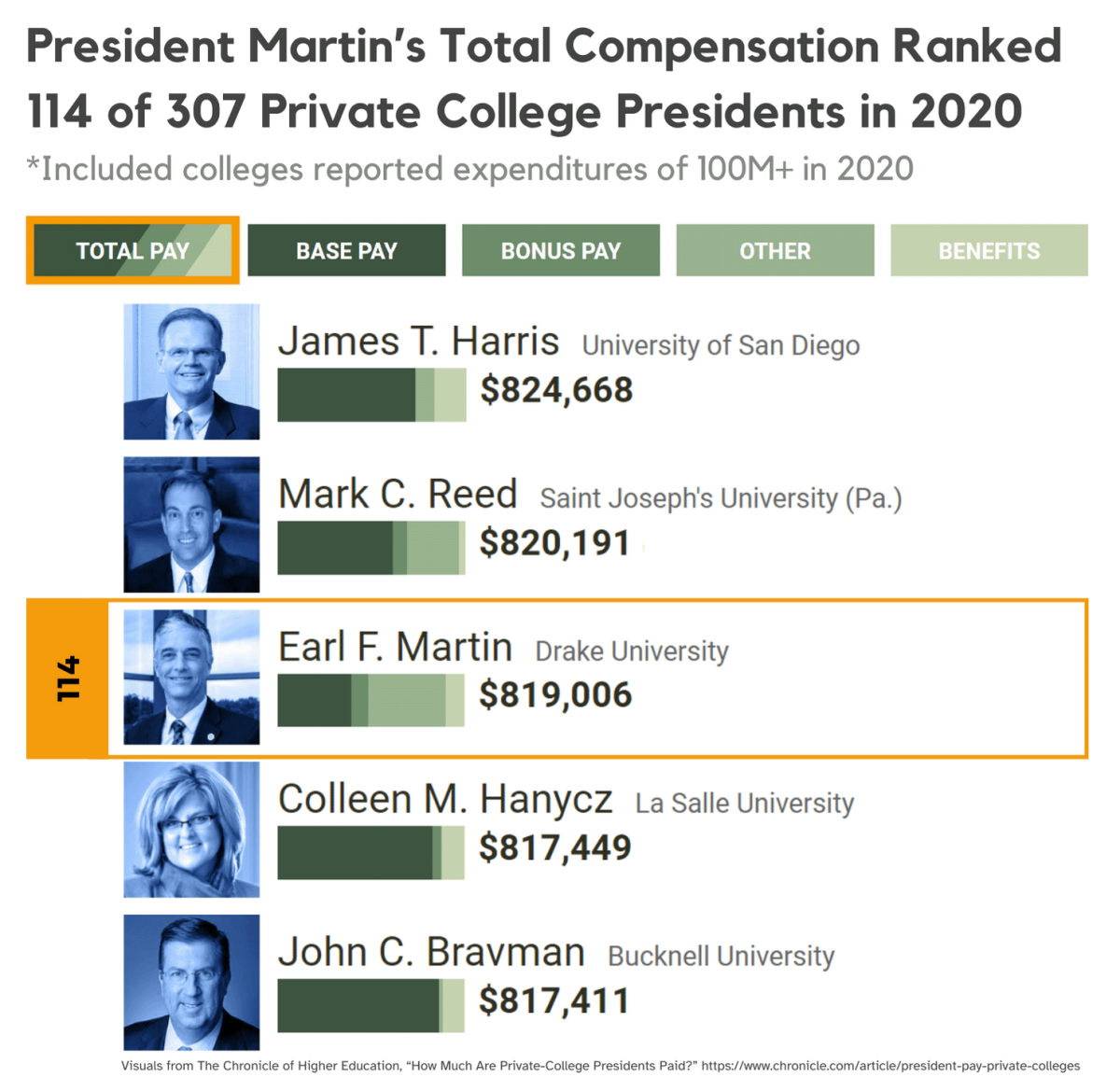After The Times-Delphic was notified by individual faculty members that President Marty Martin’s pay significantly increased in the fiscal year ending in 2021, the TD looked at Drake’s publicly available tax records from ProPublica’s Nonprofit Explorer.
According to a Chronicle of Higher Education article ranking the pay of presidents of private colleges in the U.S. with expenditures of more than $100 million, Martin’s total pay is fairly middle-of-the-road — he ranks 114 out of 307.
The TD asked Martin for information regarding components of his salary and consulted with Stephen Gara, an associate professor of accounting at Drake.
Martin’s four-year total salary average from fiscal years 2019-2022 was about $702,000. In FY 2021, Martin’s salary was roughly $300,000 more than the other years, according to ProPublica’s Nonprofit Explorer:
| FY 2019 | $625,685 |
| FY 2020 | $612,654 |
| FY 2021 | $903,694 |
| FY 2022 | $665,581 |
When looking through ProPublica’s Nonprofit Explorer, most of Martin’s increased pay in FY 2021 is reported as “other compensation” on the 990 schedule J tax form. Martin said most of the increase in pay was caused by a five-year payment negotiated when his first contract began on July 1, 2015. Martin said this payment builds up over the course of five years, and the IRS requires him to take it at the conclusion of the fifth fiscal year.
“The purpose is to encourage you to finish your contract,” Martin said in an interview. “Because if I went for four and a half years and left, I don’t get any of that money — no president does. That’s what its purpose is: to keep the executive in the role through the conclusion of the contract.”
Senior administration salary cuts
Beginning on July 1, 2020 senior administrators took a 15-20% reduction in pay. On June 11, 2020, Martin told faculty and staff he would take a 20% reduction in pay and cuts to other benefits.
“I did not take a university provided car as provided in my contract for both FY21 and FY22, and I covered the cost of the university’s club membership, which is also listed as a benefit in my contract, for FY21,” Martin said via email to the TD.
These salary reductions were taken “in order to prepare for the financial consequences of COVID-19.” In an interview with the TD, Martin said the 20% cut was applied solely to his base compensation.
Martin said the reduction in his base pay was spread out amid multiple calendar years and therefore is not visible in the tax documents in the ProPublica Nonprofit Explorer, which only shows the fiscal year.
“[The reductions] show up across two different 990s, but you can see there in December, November, October, September, August and July. All of those months were subject to the 20% reduction,” Martin said in regards to his 20% salary reduction.
The University’s non-administration cuts to balance the budget
Multiple faculty members expressed anger about the University’s suspension of contributions to their retirement plans and temporary salary cuts in 2020, the TD reported in May.
In an email Martin sent to faculty on June 11, 2020, he explained that, after reducing operating expenses “to only essential activities,” the only way Drake could manage their “deficit going forward” was by reducing the compensation budget. The University couldn’t fill the gap through further cuts to operational expenses. Martin noted that 68% of the budget is devoted to salaries.
“The amount of extraordinary COVID-19 expenses and lost revenue for FY21 starts at approximately $7 million and increases from there depending on a myriad of factors,” Martin said in that June email.
In an attempt to balance the budget, the University enacted a series of cost-saving measures during summer 2020. On May 12, 2020, Martin announced Drake would suspend contributions to Drake employee’s 401(k) retirement plans beginning on July 1. In the last week of June and first three weeks of July, over 50 staff members were given temporary unpaid leave.
These three cost-reduction actions — administration salary cuts, the retirement contribution pause, and the furloughs — saved the University $5.9 million, Marty said in an email to faculty and staff on July 31, 2020.
Finally, starting on Sept. 1, temporary faculty salary cuts were enacted. Faculty making less than $49,000 received no pay reductions. Faculty making $50,000 to $74,999 range received a 5% reduction, faculty making $75,000 to $104,999 received a 8% reduction in pay and faculty making $105,000 or more received a 11% reduction. Through these temporary salary cuts, Drake saved almost $2.6 million in total.
Along with cost-reduction measures not mentioned, Drake saved around $12.3 million.
Martin explains increase in bonus and incentive compensation
Over four fiscal years, Martin’s bonus and incentive compensation increased from $50,000 in FY 2019 to $120,000 in FY 2022. In regards to these increases, Martin said the Board of Trustees determines what bonus he receives in an annual process.
“At the beginning of each academic year performance goals are set for me by the Board,” Martin said via email. “I am then evaluated against those goals at the end of the year by the Board through the work of its Compensation Committee. My participation in this is a self-evaluation I submit to the Board, normally in May of each year.”
He elaborated in an interview that his performance goals are set around “maintaining adherence to our academic mission,” Drake’s financial performance through the operating budget, fundraising, admissions, neighborhood developments and partnerships and “other external relations.”
Gara said that, during the pandemic, “a lot” of executives and those in leadership roles “were forgoing bonuses, or at least deferring them until after COVID was over.” He said it’s possible that Martin’s contract might prevent him from forgoing his bonus, but that was not confirmed with Martin.
According to an Inside Higher Education article, university presidents and athletic administrators also took pay cuts due to the recession and COVID-19 pandemic.
Martin stated in the June 11, 2020 email that all the cost-saving measures to reduce the compensation budget were made to balance the budget by the end of the 2021 fiscal year.
“While these decisions are difficult, they are undertaken with care guided by our core values of ‘all in this together’ and ‘commitment to mission,’” Martin wrote. “Thank you for your continued best efforts as we meet and overcome the challenges presented by the COVID-19 pandemic.”
Additional reporting by Mack Swenson and Andrew Kennard.








